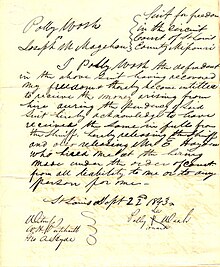Polly Berry | |
|---|---|
 "I, Polly Wash...having recovered my freedom..." (1843) | |
| Born | Polly Beatty |
| Other names | Based upon her slaveholder's surnames: Polly Crockett, Polly Berry, and Polly Wash |
| Occupation(s) | Domestic servant, laundress, seamstress |
| Known for | Freedom suit Polly Wash v. Joseph M. Magehan |
| Children | Nancy Berry, Lucy A. Berry Delaney |
| Part of a series on |
| Forced labour and slavery |
|---|
 |
Polly Berry (c.1803–1805 – after 1865) was an African American woman notable for winning two freedom suits in St. Louis, one for herself, which she won in 1843, and one for her daughter Lucy, which she won in 1844. Having acquired the surnames of her slaveholders, she was also known as Polly Crockett and Polly Wash, the latter of which was the name used in her freedom suit.
Polly was born into slavery in Kentucky, first held by the Beatty family. She was separated from her mother when she was seven or eight years of age, when she was sold to Joseph Crockett. In October 1817, the Crocketts moved to Illinois, taking Polly with them. While in Illinois, she worked in exchange for lodging for the Crockett family, corn for their livestock, and $2 a day in wages. According to state law, enslaved people were freed after residing in the state for more than 90 days. In April 1818, Crockett had Polly taken to Missouri, where she was sold. She was with different owners over a five-year period, and then sold to Major Taylor Berry. After his death, she was owned by Taylor's wife, Fannie, and upon her death she was held as an enslaved woman by Judge Robert Wash. She was with the Berry and Wash families for 12 or 13 years. During that time, she was married to one of the Berry's enslaved men. They had two daughters, Nancy and Lucy. Robert Wash sold her husband to someone in the Deep South, separating Polly and her husband for the rest of their lives.
Polly sought freedom for herself and her daughters. Her daughter Nancy escaped to Canada. She sued for her own freedom based on having been held illegally as a child slave in the free state of Illinois. In 1842, Polly sued for the freedom of her daughter Lucy Ann Berry, as the girl had legally been born to a free woman. That case was argued by Edward Bates, the future United States Attorney General under President Abraham Lincoln.
Wash was declared a free woman of color and received a freedom bond on September 26, 1843 and was allowed to reside in the state of Missouri.[1] In a separate, but related suit, Lucy was freed. The mother and daughter worked together as seamstresses and lived together with Lucy's husband of 42 years.
Polly's life is known through the records of her freedom suit and her daughter Lucy Delaney's memoir, From the Darkness Cometh the Light, or, Struggles for Freedom (1891), which give different accounts of Polly's life before Lucy was born.
- ^ "Free Negro Bond for Wash (Polly Wash)". St. Louis Circuit Court Historical Records Project, Washington University in St. Louis. Retrieved January 29, 2022.
Know all men by these presents that we Polly Wash as principal and Elijah Hayden as security each acknowledge themselves indebted to the held and firmly bound to the State of Missouri in the sum of two hundred dollars for the payment of which sum well & truly to be made we do each of us bind ourselves our heirs executors & administrators firmly by these presents. In testimony whereof we have hereunto set our hands & seals this 26th day of September 1843. The Condition of this Obligation is such that whereas the County Court of St Louis County has this day granted to the said Polly Wash a free Woman of Colour a license to reside in this State, Now if the said Polly Wash during her residence in this State shall be of good behaviour then this obligation shall be null & void. Otherwise to be in full force & virtue in law. Polly her x mark Wash Seal. E. Hayden Seal.